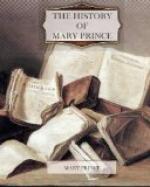The case having been submitted, by desire of the Anti-Slavery Committee, to the consideration of Dr. Lushington and Mr. Sergeant Stephen, it was found that there existed no legal means of compelling Mary’s master to grant her manumission; and that if she returned to Antigua, she would inevitably fall again under his power, or that of his attorneys, as a slave. It was, however, resolved to try what could be effected for her by amicable negotiation; and with this view Mr. Ravenscroft, a solicitor, (Mr. Stephen’s relative,) called upon Mr. Wood, in order to ascertain whether he would consent to Mary’s manumission on any reasonable terms, and to refer, if required, the amount of compensation for her value to arbitration. Mr. Ravenscroft with some difficulty obtained one or two interviews, but found Mr. Wood so full of animosity against the woman, and so firmly bent against any arrangement having her freedom for its object, that the negotiation was soon broken off as hopeless. The angry slave-owner declared “that he would not move a finger about her in this country, or grant her manumission on any terms whatever; and that if she went back to the West Indies, she must take the consequences.”
This unreasonable conduct of Mr. Wood, induced the Anti-Slavery Committee, after several other abortive attempts to effect a compromise, to think of bringing the case under the notice of Parliament. The heads of Mary’s statement were accordingly engrossed in a Petition, which Dr. Lushington offered to present, and to give notice at the same time of his intention to bring in a Bill to provide for the entire emancipation of all slaves brought to England with the owner’s consent. But before this step was taken, Dr. Lushington again had recourse to negotiation with the master; and, partly through the friendly intervention of Mr. Manning, partly by personal conference, used every persuasion in his power to induce Mr. Wood to relent and let the bondwoman go free. Seeing the matter thus seriously taken up, Mr. Wood became at length alarmed,—not relishing, it appears, the idea of having the case publicly discussed in the House of Commons; and to avert this result he submitted to temporize—assumed a demeanour of unwonted civility, and even hinted to Mr. Manning (as I was given to understand) that if he was not driven to utter hostility by the threatened exposure, he would probably meet our wishes “in his own time and way.” Having gained time by these manoeuvres, he adroitly endeavoured to cool the ardour of Mary’s new friends, in her cause, by representing her as an abandoned and worthless woman, ungrateful towards him, and undeserving of sympathy from others; allegations which he supported by the ready affirmation of some of his West India friends, and by one or two plausible letters procured from Antigua. By these and like artifices he appears completely to have imposed on Mr. Manning, the respectable West India merchant whom Dr. Lushington had asked to negotiate with him; and he prevailed so far as to induce Dr. Lushington himself (actuated by the benevolent view of thereby best serving Mary’s cause,) to abstain from any remarks upon his conduct when the petition was at last presented in Parliament. In this way he dextrously contrived to neutralize all our efforts, until the close of the Session of 1829; soon after which he embarked with his family for the West Indies.




